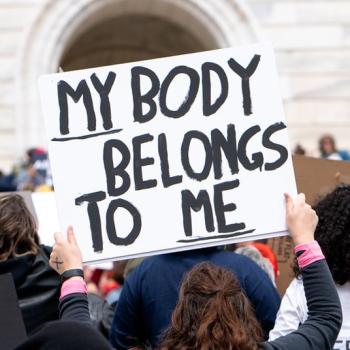As I grew up, I was taught in no uncertain terms that Original Sin is absolutely factual. Like the idea of the inerrancy of Scripture, Original Sin was not to be questioned. My teachers – like yours, no doubt – dismissed every objection to the doctrine with “anything that doesn’t make sense to us is merely proof that we are not as smart as God. Don’t even try to figure God out. Accept the facts.”
But who gets to decide what is a fact? Don’t say “the Bible,” because the Bible doesn’t always explain itself. People read what the Bible says and then interpret it. Sometimes, we come up with doctrines completely out of our own minds.
Two examples that I’ve written about before:
- In the early 300s AD, controversy arose over the person of Christ. Over 300 bishops came to the First Council of Nicaea (325 AD) for a debate. One group regarded Jesus as divine and co-eternal with God the Father, while the other considered him to be the first among created beings and inferior to God the Father. Both sides had Scripture to back them up. After debate, the bishops voted.
That’s right: Jesus was determined to be divine by majority rule. And so, officially, the Godhead included the Father and the Son.
- A few decades later, the First Council of Constantinople decided – again, by vote – that the Holy Spirit was also part of the Godhead.
That’s right: before 381, the concept of the Trinity didn’t exist. It hadn’t been invented.
Today, we wouldn’t think of questioning the divinity of Jesus or the trinitarian nature of God (at least most of us wouldn’t). But neither of those doctrines are purely biblical.
(Commercial: if you question “business as usual” in Christianity – or want to question it – subscribe to my newsletter, and we can journey together!)

Meet Pelagius, the “heretic”
Pelagius was a theologian in the late 4th – early 5th centuries CE. He is known for disagreeing with Augustine, one of the greatest influences on Western theology. Pelagius believed that Augustine’s doctrine of divine grace – the idea that all humans are depraved, but that God’s grace forgives and saves believers – was causing the society of his day to be morally lax (that is, “God always forgives us, so let’s have fun!”).
Pelagius held that with effort, we can (at least in theory) avoid sinning, and that our free will includes the possibility of choosing to obey God.
Augustine, shocked that someone who disagreed with his carefully thought out doctrines was still running around free, called together a group of theologians, the Council of Carthage, in 418 to condemn Pelagius’ teachings. Of course the attendees were in agreement with Augustine. And of course Pelagius was condemned.
But what if a truly impartial gathering had discussed and debated Pelagius’ and Augustine’s teachings? What if, after a vote, Pelagius had been declared orthodox and Augustine heretical? Christianity today would look much different.
The Bible tells me so?
I know some of you are thinking, “original sin is definitely biblical. There are verses that make it absolutely clear. No way Pelagius could have made a convincing case.”
I know which verses you’re thinking about:
- “For all have sinned and fall short of the glory of God.” (Romans 3:23)
- “Every one of them is gone back: they are altogether become filthy; there is none that doeth good, no, not one.” (Psalm 53:3)
- “Behold, I was brought forth in iniquity; and in sin did my mother conceive me.” (Psalm 51:5)
But did you know that there are other verses (many of them) that oppose the idea that we are born sinners and guilty and condemned for the sin of Adam? Here are just a few examples:
- “The son shall not bear the iniquity of the father; neither shall the father bear the iniquity of the son: the righteousness of the righteous shall be upon him, and the wickedness of the wicked shall be upon him.” (Ezekiel 18:20; also see Deut. 24:16, 2 Chron. 25:4)
- “Indeed, when Gentiles, who do not have the law, do by nature things required by the law, they are a law for themselves, even though they do not have the law. They show that the requirements of the law are written on their hearts, their consciences also bearing witness, and their thoughts sometimes accusing them and at other times even defending them.” (Romans 2:14-15)
- “There was a man in the land of Uz, whose name was Job; and that man was perfect and upright, and one that feared God and eschewed evil…Then the Lord said to Satan, ‘Have you considered my servant Job? There is no one on earth like him; he is blameless and upright, a man who fears God and shuns evil.’” (Job 1:1, 8)
- “Enoch walked with God: and he was not; for God took him.” (Genesis 5:24)
- “Noah was a just man and perfect in his generations, and Noah walked with God.” (Genesis 6:9)
- “And they [Zachariah and Elizabeth] were both righteous before God, walking in all the commandments and ordinances of the Lord blameless.” (Luke 1:6)
- “The children being not yet born, neither having done any good or evil…” (Romans 9:11)
Middle ground
So! What do you think? Complicates matters, doesn’t it?
Hey, you don’t have to make a choice. We don’t have to take a stand for or against original sin. How about this idea: we acknowledge that when it comes to the things of God, nobody knows for sure. How about this corollary: it’s okay to not know for sure.
If you grew up evangelical, you’re not used to uncertainty. Like me, you’re used to black-and-white thinking, knowing what’s right, and always being right. I hope that, like me, you’re starting to see that being “right” is closely linked to being uninformed.
We need to operate in nuance (one of my favorite topics to write about). In doing so, we might take a page from Augustine and a page from Pelagius, and find agreements, like:
- Maybe the world is neither pure evil nor pure good – maybe it’s just not as good as we want it to be.
- Maybe part of the reason the world is so corrupt is because humans have made some bad choices. Maybe there were moments when we could have changed the course of history.
- Maybe I am neither utterly depraved nor utterly pure – maybe I’m just not as good as I want to be, or as bad as I could be.
- Maybe I am influenced by things outside my control that block me from being my best – my past, generational trauma, etc.
- Maybe people who don’t know Jesus as savior are capable of doing truly good things, and people who do know Jesus are capable of doing truly terrible things.
Do any of those ring true for you? They do for me.
And I’ll tell you what, I don’t think I’m being wishy-washy by taking the middle route. Life is complex, enigmatic, paradoxical. It requires a nuanced approach.
This is already a long post, and I have a lot more thoughts on the Bible and original sin. I’ll share them next time.
(If you are energized by challenges to the evangelical status quo like this, you’d enjoy my blog. If you would like to comment, please pop over to my Facebook page. All of my posts are there and open to constructive comment! I welcome your thoughts. And don’t forget to subscribe to my newsletter!)
OTHER POSTS YOU MIGHT FIND INTERESTING:
Examining the doctrine of Biblical inerrancy
Paradigm shift: the Parable of the Diaper
Will the “unreached” go to heaven? – Part One, an evangelical answer
Will the “unreached” go to heaven? – Part Two, a ruthless God
FEATURED IMAGE: Photo by Julio Rionaldo on Unsplash













